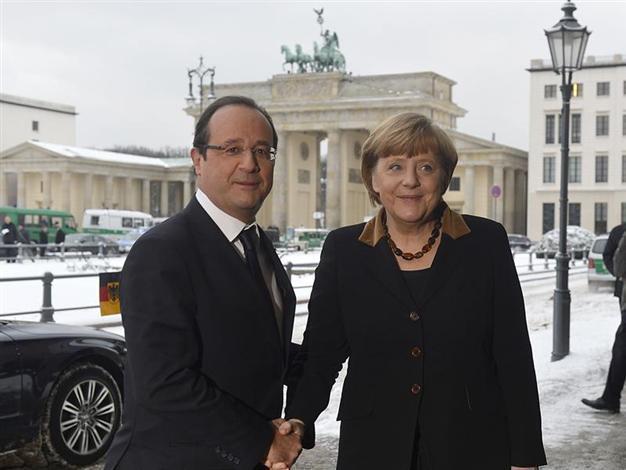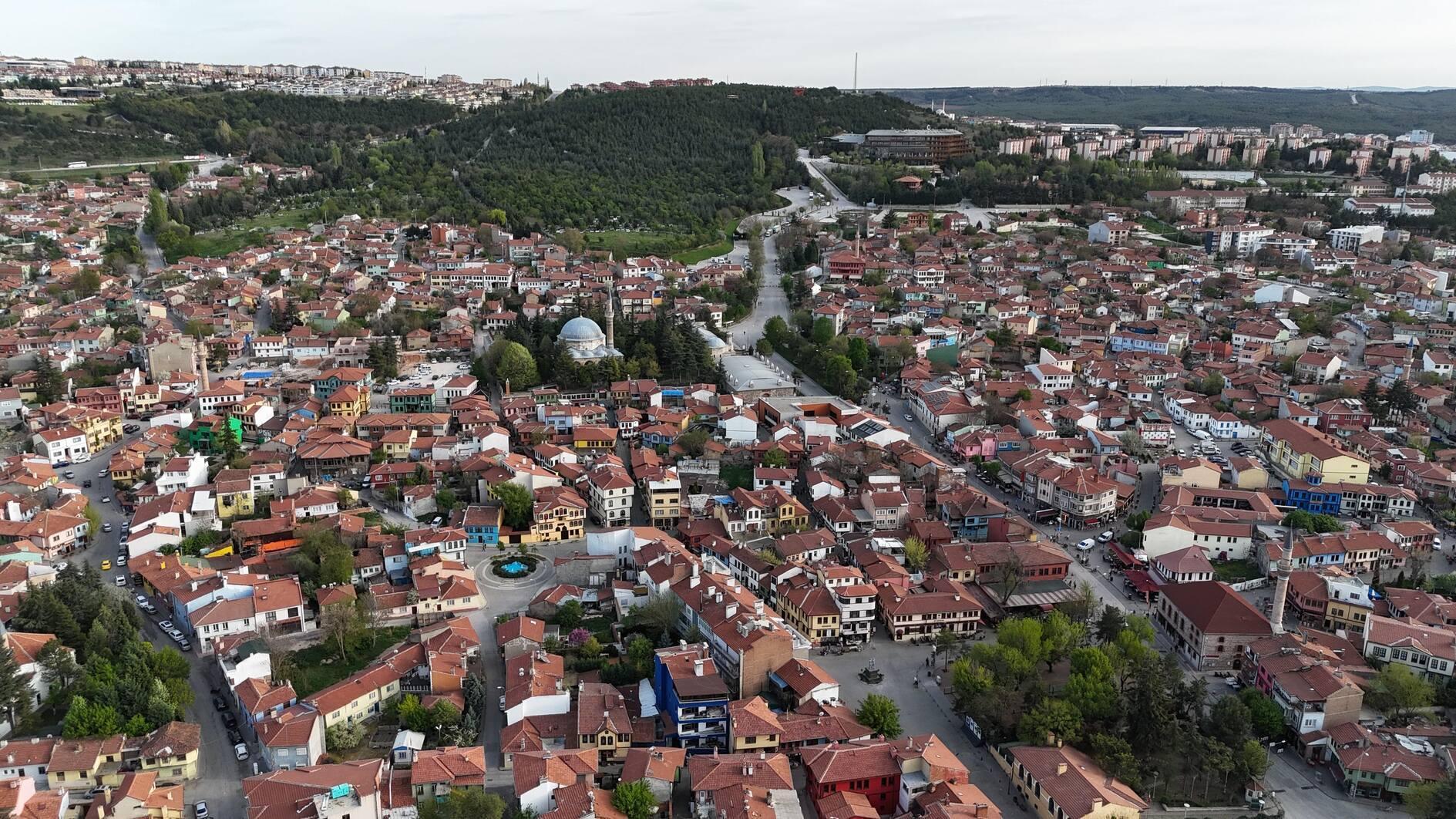Germany, France paper over euro cracks in show of unity
BERLIN/PARIS - Reuters

French President Francois Hollande (L) shakes hands with German Chancellor Angela Merkel as they pose in front of the Brandenburg Gate as they arrive at the French Embassy in Berlin on January 22, 2013 for a meeting as part of the celebration to mark 50 years since the Elysee Treaty launched after WWII the French-German cooperation. AFP photo
German Chancellor Angela Merkel hosts French President Francois Hollande and his government today for a celebration marking half a century of post-war partnership, even as their countries struggle to forge a common vision for crisis-hit Europe.Fifty years after Konrad Adenauer and Charles de Gaulle signed the Elysee Treaty that sealed a reconciliation between the former adversaries, Berlin and Paris are determined to put on a rousing display of unity.
A meeting of both cabinets will be followed by a joint session of parliament in the Reichstag building where Adolf Hitler gave some of his most famous World War Two speeches. In the evening, the German and French leaders will attend a concert at the Berlin Philharmonic.
Merkel and Hollande, born less than a month apart in the summer of 1954, have overcome an awkward start to their relationship, complicated by her vocal support for the French president's rival in the 2012 election and his condemnation of the German chancellor's austerity policies during the campaign.
After six months of earnest handshakes, the two now kiss each other on the cheek when they meet. In recent months, Berlin and Paris have forged complex compromises on European bank supervision and reform of a politically-sensitive shareholder pact governing EADS, the parent of planemaker Airbus.
But on perhaps the biggest policy issue hanging over Europe as it struggles to emerge from its three-year old debt crisis - the drive for closer economic integration - the Franco-German motor is barely revving.
And at a time when Europe can ill afford it, both leaders are turning there attention elsewhere - Merkel to her re-election bid and Hollande to France's ailing economy and risky military intervention in Mali.
"The Franco-German conflict which has been looming for months is over closer integration," said Daniela Schwarzer, an expert on Franco-German relations at the German Institute for International and Security Affairs.
"But the closer we get to the election, the less likely it is that the Germans push for something big. And Hollande has still not said how much he is willing to do, how much sovereignty he might be ready to cede. The integration push is already losing momentum in my view."
As long as the euro crisis remains under control and markets stay calm, the two can afford not to engage on the issue. But another flare-up would raise pressure on Merkel, who preaches tighter central controls over European budgets, and Hollande, who favours more risk-sharing, to bridge their deep differences on how to push Europe forward.
The French president swept into office in May last year vowing to reverse Merkel's focus on budget consolidation in Europe, launch new growth-boosting initiatives and end the "exclusive" relationship with Germany he accused his conservative predecessor Nicolas Sarkozy of nurturing.
But his victories have been more symbolic than substantive. After a brief flirt with Italy and Spain in the second half of 2012 that spawned talk of a new anti-German southern bloc within Europe, Hollande has turned back to Berlin, keen not to be lumped too closely with the euro's troubled periphery at a time when France's own economy is wobbling and in need of reform.
"Hollande is under a great deal of pressure at home," an adviser to Merkel said. "On European issues he remains very vague. He is still in a learning process."
In Paris, there are also frustrations. The appointment of Dutch Finance Minister Jeroen Dijsselbloem - an unknown on the European scene - to the post of Eurogroup chairman was seen as an example of the kind of lowest-common-denominator compromise that gives Franco-German cooperation a bad name.
Yet officials in both capitals play down the differences between the two leaders, describing their relationship as friendly and stressing the similarities in temperament. Hollande, unlike the often hyperactive Sarkozy, is reserved and modest, like Merkel.
At a joint appearance with French and German students on Monday evening in Berlin, the two leaders talked about harmonising corporate tax rates within Europe.
On Tuesday, their governments are due to issue a joint statement announcing a will to work on new areas of cooperation, including on youth policy, culture, energy and defence.
But both sides say little of substance will come out of the meetings in Berlin.
"Merkel and Hollande will send a political message that Germany and France will continue to work together on the construction of economic and monetary union," one official in Berlin said. "But don't expect a new dimension in bilateral cooperation."
Limbo year?
The 1963 signing of the Elysee Treaty by France's President Charles de Gaulle and German Chancellor
Konrad Adenauer aimed to foster deep ties between the nations less than two decades after the Nazi occupation of France.
Over the years the treaty has spawned separate agreements in education, culture and defence that have sent millions of young French and Germans on language-learning exchange trips, created a joint TV channel and Europe's first cross-border army brigade.
While it is arguable whether it has led to a genuine cultural affinity - fewer French and Germans speak each others' language than in 1963 - the broad goal of post-war reconciliation of their peoples has been achieved.
The fact that 150 million French and Germans between them represent the southern and northern, Catholic and Protestant axes of Europe while generating over a third of EU output has given the partnership unparalleled political and economic clout.
But at each chapter in the history of the European Union, the entente is painfully stretched until a compromise is found - and the euro zone's debt crisis has stretched it more than most.
The much-hyped "Merkozy" rapport between the two conservative leaders gave way to a more prickly debut to the Hollande-Merkel relationship, with the French Socialist initially keen to emphasise policy differences with Berlin.
Officials insist the relationship, while not warm, has since made it on to a better footing. A diplomatic source in Hollande's office said they both favoured a workman-like style over the policy pyrotechnics of Sarkozy.
"After the change in government in France, both sides needed time to get to know each other - that is normal," said Michael Link, the German foreign ministry official who handles relations with Paris.
Link and others noted that Paris and Berlin finally managed late last year to overcome a dispute on how to supervise the EU's planned new banking union. They cite this as proof that the relationship is working, but the two governments remain apart on future steps to coordinate economic policy more closely.
"The French side is reluctant to transfer sovereignty unless it is in exchange for steps that are in French interests: a European unemployment insurance scheme, a big euro zone budget, eurobonds," said Daniela Schwarzer at Berlin's German Institute for International and Security Affairs in Berlin.
"For this German government, these are taboo."
Germany "struggles" with leadership
France's Europe Minister Bernard Cazeneuve argued to Reuters such divergences have been an "inseparable" part of the Franco-German partnership for decades that have always been surmounted.
But in wider French circles, German intransigence on the policies for promoting growth which Hollande calls "integration with solidarity" is beginning to grate.
With Hollande promising to balance French public finances by 2017 and embarking on policies such as labour reform during an economic downturn, calls for Germany to play its part by easing off on EU-wide austerity are frequent.
"France finds it hard to accept Germany's economic leadership and Germany finds it hard to define that leadership," said French industrialist Louis Gallois, who advised Hollande on steps to boost France's flagging economic competitiveness.
"The leader should take into account Europe's interests as well as its own ... I think Germany is still struggling to take into account Europe's interests," he told Reuters last month.
Yet others say the euro zone survived last year because Merkel came around to a view closer to France's: that Greece must not be abandoned and that the European Central Bank should be allowed to use its massive firepower to prevent future market assaults on weak euro zone states.
Thomas Klau of the European Council on Foreign Relations cited ECB chief Mario Draghi's promise last year to do whatever was needed to rescue a euro zone country in trouble. "The Draghi shift was embedded in an Hollande-Merkel consensus," he said.
To what extent that shift in Merkel's thinking last August was influenced by Hollande or by Greek promises to commit to a painful austerity course is debatable.
With little prospect of any major new Franco-German policy moves until after Germany's general election - and possibly not before French local elections in March 2014 - ambitions for the partnership have already been toned down.
A German finance ministry official noted discussions between the two capitals on next steps were "very slow-moving".
"There is a keenness in France and Germany not to be spectacular," said Cazeneuve. "The crisis means we will be concentrating on operational efficiency.
















